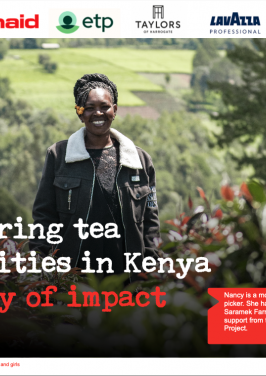Empowering tea communities in Kenya
Research commissioned by Ethical Tea Partnership (ETP) and its partners looks into low incomes, poor working conditions, lack of access to vital public services and high rates of violence against women in Kenya's tea-picking communities.
Executive summary
Approximately 300,000 workers are hired by smallholder farmers in Kenya. The majority are young, landless women (aged 24-35), many of whom are economic migrants from other regions who move to tea growing areas in search of jobs. Workers are typically hired on a casual basis without formal contracts and are paid a piece rate per kilogram of tea plucked.
The informal nature of their employment means they are more likely to face low incomes and poor working conditions, and to lack access to vital public services such as clean water, safe housing, healthcare, and education.
This research commissioned by Ethical Tea Partnership (ETP) and its partners also looks into high rates of violence against women in the smallholder tea sector in Kenya, with weak mechanisms in place to prevent and respond to violence.
